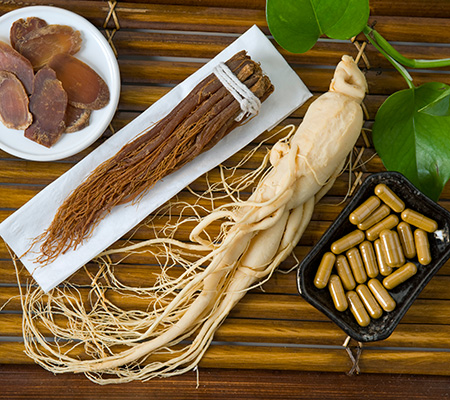
Different forms of ginseng, including dried slices, dried roots and pills, may have different effects.
Ginseng is one of the most popular natural ways to treat and prevent colds.
Studies have shown it can reduce the duration of the common cold when taken preventatively for eight to 16 weeks. Besides improving your immune system, ginseng may lower blood sugar.
It may sound like a wonder supplement, but taking ginseng isn’t right for everyone. Taking any herbal supplement warrants a word of caution.
Some people claim ginseng improves concentration, energy, athletic performance, digestion, high blood pressure, menopausal symptoms and arthritis. Most of these claims aren’t backed by scientific evidence.
“Be cautious of unproven supplement claims,” said Chrisanne Urban, a Marshfield Clinic dietitian. “If it sounds too good to be true, it probably is.”
Know what you’re taking
The medicinal and side effects of ginseng described in this blog post refer to American ginseng. Asian and Siberian ginseng have different effects. Know what you’re buying and learn about the risks, benefits and side effects before you try an herbal supplement.
American ginseng comes in different forms, including slices of dried ginseng root, powder, liquid, lozenges and tea. Different ginseng products may have different effects.
The Food and Drug Administration doesn’t regulate the supplement industry,” Urban said. “That means manufacturers don’t have to prove supplements are safe or effective.”
If you take ginseng to ward off colds, do so for a short period of time. Limit your intake to 100-300 mg daily for no longer than 12 weeks.
Don’t mix ginseng with certain medications and health conditions
“Consult with your primary care provider or pharmacist to check for possible interactions with medications you take,” Urban said.
Talk to your doctor about using ginseng if you take any of these medications:
- Warfarin or brand-name Coumadin: Ginseng can reduce the anticoagulant effect of these blood-thinning drugs.
- Diabetes medications: Ginseng lowers blood sugar and can cause your level to become too low when combined with medication.
- Immunosuppressants: Ginseng may strengthen your immune system, which isn’t a positive thing if you take medication for an autoimmune disorder or organ transplant.
- MAOIs: Ginseng can cause unpleasant side effects when taken with certain antidepressants.
Pregnant or breastfeeding women shouldn’t take ginseng because it hasn’t been proven safe. Talk to your pediatrician before giving ginseng to children. Stop taking the supplement if you have side effects like diarrhea, itching, trouble sleeping, headaches and nervousness.
For questions about diet, talk to a Marshfield Clinic Health System provider.
Schedule appointment Message your provider


I have taken for years we even had ginseng drinks years ago with green tea green leaf should make one ginseng with peach it's great I don't like zero drinks